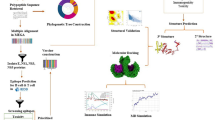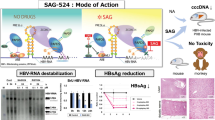Abstract
We previously identified a novel antimicrobial peptide with a broad spectrum bactericidal activity from human hepatitis B virus (HBV) core protein (HBc) arginine-rich domain (ARD). We compared the antimicrobial activities of HBcARD peptides from different hepadnaviruses which share similar amino acid sequences. In general, mammalian HBcARD peptides exhibited stronger antimicrobial activity than avian peptides. Using the strategy of D-amino acid substitutions, we improved the antimicrobial efficacy of human HBcARD peptide. This D-HBcARD peptide was much more resistant than L-HBcARD peptide to proteolytic degradation in vitro. Moreover, this D-HBcARD peptide maintained similar minimal bactericidal concentrations (MBC) against tested bacteria, and showed very low hemolytic activity. In the Staphylococcus aureus-infected mouse model, this D-HBcARD peptide was more protective than the L-HBcARD peptide. Repeated treatments with either L- or D-HBcARD peptides induced no significant immunogenicity. New derivatives of HBcARD peptides could serve as alternatives to the conventional antibiotics in clinical medicine in the future.




Similar content being viewed by others
References
Baker MP, Reynolds HM, Lumicisi B, Bryson CJ (2010) Immunogenicity of protein therapeutics: the key causes, consequences and challenges. Self Nonself 1(4):314–322. doi:10.4161/self.1.4.13904
Bessalle R, Kapitkovsky A, Gorea A, Shalit I, Fridkin M (1990) All-D-magainin: chirality, antimicrobial activity and proteolytic resistance. FEBS Lett 274(1–2):151–155
Caballero AR, Moreau JM, Engel LS, Marquart ME, Hill JM, O'Callaghan RJ (2001) Pseudomonas aeruginosa protease IV enzyme assays and comparison to other Pseudomonas proteases. Anal Biochem 290(2):330–337. doi:10.1006/abio.2001.4999
Calis JJ, Maybeno M, Greenbaum JA, Weiskopf D, De Silva AD, Sette A, Kesmir C, Peters B (2013) Properties of MHC class I presented peptides that enhance immunogenicity. PLoS Comput Biol 9(10):e1003266. doi:10.1371/journal.pcbi.1003266
Carmona G, Rodriguez A, Juarez D, Corzo G, Villegas E (2013) Improved protease stability of the antimicrobial peptide Pin2 substituted with D-amino acids. Protein J 32(6):456–466. doi:10.1007/s10930-013-9505-2
Casadevall N, Nataf J, Viron B, Kolta A, Kiladjian JJ, Martin-Dupont P, Michaud P, Papo T, Ugo V, Teyssandier I, Varet B, Mayeux P (2002) Pure red-cell aplasia and antierythropoietin antibodies in patients treated with recombinant erythropoietin. N Engl J Med 346(7):469–475. doi:10.1056/NEJMoa011931
Chang KC, Lin MF, Lin NT, Wu WJ, Kuo HY, Lin TY, Yang TL, Chen YC, Liou ML (2012) Clonal spread of multidrug-resistant Acinetobacter baumannii in eastern Taiwan. J Microbiol Immunol Infect 45(1):37–42. doi:10.1016/j.jmii.2011.09.019
Chen HL, Su PY, Chang YS, Wu SY, Liao YD, Yu HM, Lauderdale TL, Chang K, Shih C (2013) Identification of a novel antimicrobial peptide from human hepatitis B virus core protein arginine-rich domain (ARD). PLoS Pathog 9(6):e1003425. doi:10.1371/journal.ppat.1003425
Dean SN, Bishop BM, van Hoek ML (2011) Susceptibility of Pseudomonas aeruginosa biofilm to alpha-helical peptides: D-enantiomer of LL-37. Front Microbiol 2:128. doi:10.3389/fmicb.2011.00128
Falciani C, Lozzi L, Pollini S, Luca V, Carnicelli V, Brunetti J, Lelli B, Bindi S, Scali S, Di Giulio A, Rossolini GM, Mangoni ML, Bracci L, Pini A (2012) Isomerization of an antimicrobial peptide broadens antimicrobial spectrum to gram-positive bacterial pathogens. PLoS One 7(10):e46259. doi:10.1371/journal.pone.0046259
Fernandez L, Gooderham WJ, Bains M, McPhee JB, Wiegand I, Hancock RE (2010) Adaptive resistance to the “last hope” antibiotics polymyxin B and colistin in Pseudomonas aeruginosa is mediated by the novel two-component regulatory system ParR-ParS. Antimicrob Agents Chemother 54(8):3372–3382. doi:10.1128/AAC.00242-10
Hancock RE, Sahl HG (2006) Antimicrobial and host-defense peptides as new anti-infective therapeutic strategies. Nat Biotechnol 24(12):1551–1557. doi:10.1038/nbt1267
Hong SY, Oh JE, Lee KH (1999) Effect of D-amino acid substitution on the stability, the secondary structure, and the activity of membrane-active peptide. Biochem Pharmacol 58(11):1775–1780. doi:10.1016/S0006-2952(99)00259-2
Kong JS, Yoo SA, Kang JH, Ko W, Jeon S, Chae CB, Cho CS, Kim WU (2011) Suppression of neovascularization and experimental arthritis by D-form of anti-flt-1 pept ide conjugated with mini-PEG. Angiogenesis 14(4):431–442. doi:10.1007/s10456-011-9226-0
Laverty G, Gorman SP, Gilmore BF (2011) The potential of antimicrobial peptides as biocides. Int J Mol Sci 12(10):6566–6596. doi:10.3390/ijms12106566
Liu M, Li C, Pazgier M, Mao Y, Lv Y, Gu B, Wei G, Yuan W, Zhan C, Lu WY, Lu W (2010) D-peptide inhibitors of the p53-MDM2 interaction for targeted molecular therapy of malignant neoplasms. Proc Natl Acad Sci U S A 107(32):14321–14326. doi:10.1073/pnas.1008930107
McCarter JD, Stephens D, Shoemaker K, Rosenberg S, Kirsch JF, Georgiou G (2004) Substrate specificity of the Escherichia coli outer membrane protease OmpT. J Bacteriol 186(17):5919–5925. doi:10.1128/JB.186.17.5919-5925.2004
Melo MN, Ferre R, Castanho MA (2009) Antimicrobial peptides: linking partition, activity and high membrane-bound concentrations. Nat Rev Microbiol 7:245–250. doi:10.1038/nrmicro2095
Mendez-Samperio P (2013) Recent advances in the field of antimicrobial peptides in inflammatory diseases. Adv Biol Res 2:50. doi:10.4103/2277-9175.114192
Merrifield EL, Mitchell SA, Ubach J, Boman HG, Andreu D, Merrifield RB (1995) D-enantiomers of 15-residue cecropin A-melittin hybrids. Int J Pept Protein Res 46(3–4):214–220. doi:10.1111/j.1399-3011.1995.tb00592.x
Noto PB, Abbadessa G, Cassone M, Mateo GD, Agelan A, Wade JD, Szabo D, Kocsis B, Nagy K, Rozgonyi F, Otvos L Jr (2008) Alternative stabilities of a proline-rich antibacterial peptide in vitro and in vivo. Protein Sci 17(7):1249–1255. doi:10.1110/ps.034330.108
Peters BM, Shirtliff ME, Jabra-Rizk MA (2010) Antimicrobial peptides: primeval molecules or future drugs? PLoS Pathog 6(10):e1001067. doi:10.1371/journal.ppat.1001067
Potempa J, Dubin A, Korzus G, Travis J (1988) Degradation of elastin by a cysteine proteinase from Staphylococcus aureus. J Biol Chem 263(6):2664–2667
Schellekens H (2002) Immunogenicity of therapeutic proteins: clinical implications and future prospects. Clin Ther 24(11):1720–1740 . doi:10.1016/S0149-2918(02)80075-3discussion 1719
Schmidtchen A, Frick IM, Andersson E, Tapper H, Bjorck L (2002) Proteinases of common pathogenic bacteria degrade and inactivate the antibacterial peptide LL-37. Mol Microbiol 46(1):157–168. doi:10.1046/j.1365-2958.2002.03146.x
Su CH, Wang JT, Hsiung CA, Chien LJ, Chi CL, Yu HT, Chang FY, Chang SC (2012) Increase of carbapenem-resistant Acinetobacter baumannii infection in acute care hospitals in Taiwan: association with hospital antimicrobial usage. PLoS One 7(5):e37788. doi:10.1371/journal.pone.0037788
Tugyi R, Uray K, Ivan D, Fellinger E, Perkins A, Hudecz F (2005) Partial D-amino acid substitution: improved enzymatic stability and preserved Ab recognition of a MUC2 epitope peptide. Proc Natl Acad Sci U S A 102(2):413–418. doi:10.1073/pnas.0407677102
Vaucher Rde A, Velho Gewehr Cde C, Correa AP, Sant'Anna V, Ferreira J, Brandelli A (2011) Evaluation of the immunogenicity and in vivo toxicity of the antimicrobial peptide P34. Int J Pharm 421(1):94–98. doi:10.1016/j.ijpharm.2011.09.020
Wang G, Li X, Wang Z (2009) APD2: the updated antimicrobial peptide database and its application in peptide design. Nucleic Acids Res 37(Database issue):D933–D937. doi:10.1093/nar/gkn823
Acknowledgment
This research was supported by Academia Sinica and the Ministry of Science and Technology (MOST 104-2325-B-001-002-, MOST 104-0210-01-09-02, and MOST 105-0210-01-13-01), Taiwan. We are grateful to Dr. Kai-Chih Chang for the bacterial strains. HLC was funded by a postdoctoral fellowship from Academia Sinica, Taiwan.
Author information
Authors and Affiliations
Corresponding author
Ethics declarations
All animal experiments were conducted under protocols approved by Academia Sinica Institutional Animal Care & Utilization Committee (ASIACUC permit number 12–02-322). Research was conducted in compliance with the principles stated in the Guide for the Care and Use of Laboratory Animals, National Research Council, 1996.
Conflict of interest
The authors declare that they have no conflict of interest.
Rights and permissions
About this article
Cite this article
Chen, HL., Su, PY. & Shih, C. Improvement of in vivo antimicrobial activity of HBcARD peptides by D-arginine replacement. Appl Microbiol Biotechnol 100, 9125–9132 (2016). https://doi.org/10.1007/s00253-016-7621-6
Received:
Revised:
Accepted:
Published:
Issue Date:
DOI: https://doi.org/10.1007/s00253-016-7621-6




